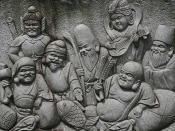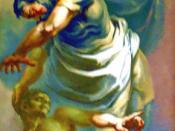In the article "Some Puzzles Concerning Omnipotence," by George Mavrodes, God's unlimited powers are contested. Specifically, God's omnipotence is challenged by a puzzle concocted by philosophers called the "paradox of the stone." The paradox follows that if God is omnipotent, than he can make a stone such that it is too large for him to lift. However, if he can make such a stone and does not have the power to lift it than God is not omnipotent. On the other end of this paradox we could say that God cannot make a stone that he cannot life because he is omnipotent. Again, if God were indeed omnipotent he would be able to make the stone even if it were too heavy for him to lift. Mavrodes states that this paradox is a poor argument for the omnipotence of God.
Mavrodes starts off by saying that the mere phrase "a stone too heavy for God to lift" is in itself contradictory.
This is because if we assume gods to be omnipotent then it would not make sense to say, "a god with sufficient power to lift any stone does not have the power to lift the stone which he creates." Again assuming the omnipotence of God, the existence of a stone too heavy for God to lift is implausible because of God's omnipotence. It is God's infinite power (omnipotence) that makes the creation of a stone impossible while we, as men with finite power, can make objects too heavy for us to lift.
If we do not assume that God is omnipotent we can still give up a small amount of omnipotence (if this is indeed possible) and retain that God is omnipotent in lifting stone with the exception of the infinitely heavy stones that he makes.



Average
A decent article that could have been better with more elaboration and detail.
2 out of 3 people found this comment useful.